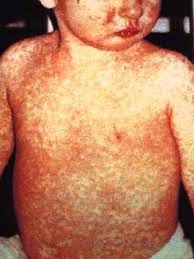Health News
 By Melissa Patrick
By Melissa Patrick
Kentucky Health News
In the wake of the highest number of measles outbreaks in the U.S. in the last 20 years, it is important to make sure you and your children are fully immunized, especially if you are traveling abroad.
Measles is a virus and is one of the most contagious diseases known. It spreads through the air when an infected person coughs or sneezes and will infect 90 percent of those who are exposed if they are not protected. It starts with a fever, followed by a cough, runny nose and red eyes. Then a rash of tiny, red spots breaks out, which starts at the head and spreads to the rest of the body. It can lead to pneumonia, swelling of the brain and death. Of every 1,000 children who get the disease, one or two will die, the CDC says.
 As of May 23, measles cases have been reported in 18 states and New York City, with most reported from Ohio (138), California (60), and New York City (26). Ninety percent have been among people who have not been vaccinated or have unknown vaccination status, according to the CDC. Most of the patients report religious, philosophical or personal reasons for avoiding vaccines. Through May 23, no deaths had been reported.
As of May 23, measles cases have been reported in 18 states and New York City, with most reported from Ohio (138), California (60), and New York City (26). Ninety percent have been among people who have not been vaccinated or have unknown vaccination status, according to the CDC. Most of the patients report religious, philosophical or personal reasons for avoiding vaccines. Through May 23, no deaths had been reported.
- It's Time To Get School-age Children Vaccinated; State Requirements Are In Place For Kindergartners And Rising Sixth Graders
An editorial in the Bowling Green Daily News about the importance of getting your child vaccinated before school starts is applicable to all communities in Kentucky. Health.comState law requires children to be vaccinated upon entering kindergarten, with...
- At Least 14 Counties Had Vaccination Rates In 2011-12 Below Level Experts Say Is Needed To Protect Kindergartners From Measles
As concern about the spread of measles from lack of vaccination grows, many Kentucky counties probably have vaccination rates below the minimum that experts say is needed to create "herd immunity" and prevent spread of the highly contagious disease among...
- Belief In Bogus Studies And Stories Undermines Use Of Vaccines That Have Been Proven Safe, Resulting In Spread Of Diseases
UPDATE: Jan. 16, 2014 4:50 Kentucky has not had any reports of measles in the past three years. It has had two cases of mumps in 2013 and two cases of mumps in 2014. Kentucky continues to have a large number of pertussis, or whooping cough,...
- Kentucky Has A Statewide Outbreak Of Whooping Cough, Perhaps Because The Child-immunization Rate Is Declining
Kentucky is having a statewide outbreak of pertussis, also called whooping cough, Jennifer Wohlleb reports for the Kentucky School Advocate, the magazine of the Kentucky School Boards Association. This comes at a time when the immunization rate...
- Avoiding Immunizations On Religious Grounds Is Risky: Bill Moyers
The movie "Contagion" has veteran journalist and commentator Bill Moyers thinking about how fast a deadly disease outbreak can spread, something that can be further propagated by children whose parents have declined to get them immunized on religious...
Health News
U.S. measles cases highest in 2 decades; blamed mainly on Americans' foreign travel, but also on opting out of vaccination

Kentucky Health News
In the wake of the highest number of measles outbreaks in the U.S. in the last 20 years, it is important to make sure you and your children are fully immunized, especially if you are traveling abroad.
"The current increase in measles cases is being driven by unvaccinated people, primarily U.S. residents, who got measles in other countries, brought the virus back to the U.S. and spread (it) to others in communities where many people are not vaccinated," Ann Schuchat, director of the Center for Immunizatons and Respiratory Diseases of the federal Centers for Disease Control and Prevention, said in a press release.
 |
| Centers for Disease Control photo |
Kentucky requires measles immunizations for children in child care and school, with exemptions made only for medical or religious purposes.
The Kentucky Annual School Immunization Survey for Kindergarten and Sixth Grade reports that for the 2013-2014 school year: 148 kindergarten students (0.3 percent) and 228 sixth graders (0.4 percent) opted out of immunization under the medical exemption, while 359 kindergartners (0.6 percent) and 249 sixth graders (0.5 percent) opted out for religious reasons.
- It's Time To Get School-age Children Vaccinated; State Requirements Are In Place For Kindergartners And Rising Sixth Graders
An editorial in the Bowling Green Daily News about the importance of getting your child vaccinated before school starts is applicable to all communities in Kentucky. Health.comState law requires children to be vaccinated upon entering kindergarten, with...
- At Least 14 Counties Had Vaccination Rates In 2011-12 Below Level Experts Say Is Needed To Protect Kindergartners From Measles
As concern about the spread of measles from lack of vaccination grows, many Kentucky counties probably have vaccination rates below the minimum that experts say is needed to create "herd immunity" and prevent spread of the highly contagious disease among...
- Belief In Bogus Studies And Stories Undermines Use Of Vaccines That Have Been Proven Safe, Resulting In Spread Of Diseases
UPDATE: Jan. 16, 2014 4:50 Kentucky has not had any reports of measles in the past three years. It has had two cases of mumps in 2013 and two cases of mumps in 2014. Kentucky continues to have a large number of pertussis, or whooping cough,...
- Kentucky Has A Statewide Outbreak Of Whooping Cough, Perhaps Because The Child-immunization Rate Is Declining
Kentucky is having a statewide outbreak of pertussis, also called whooping cough, Jennifer Wohlleb reports for the Kentucky School Advocate, the magazine of the Kentucky School Boards Association. This comes at a time when the immunization rate...
- Avoiding Immunizations On Religious Grounds Is Risky: Bill Moyers
The movie "Contagion" has veteran journalist and commentator Bill Moyers thinking about how fast a deadly disease outbreak can spread, something that can be further propagated by children whose parents have declined to get them immunized on religious...
